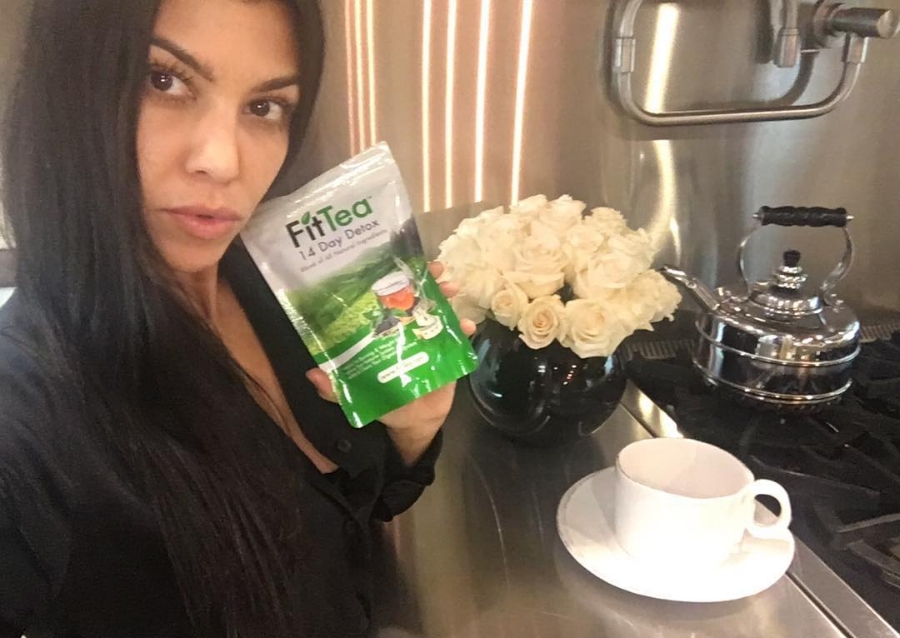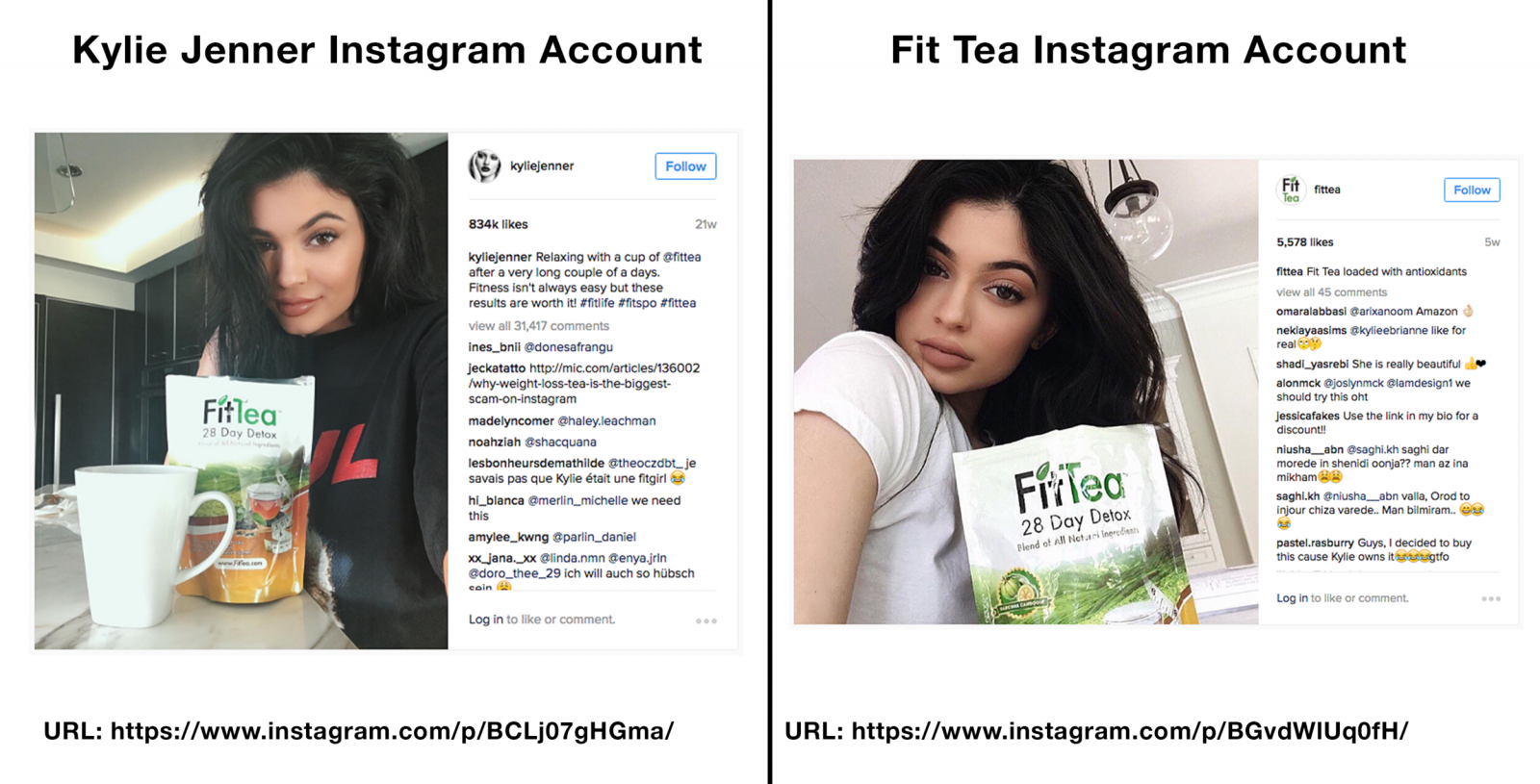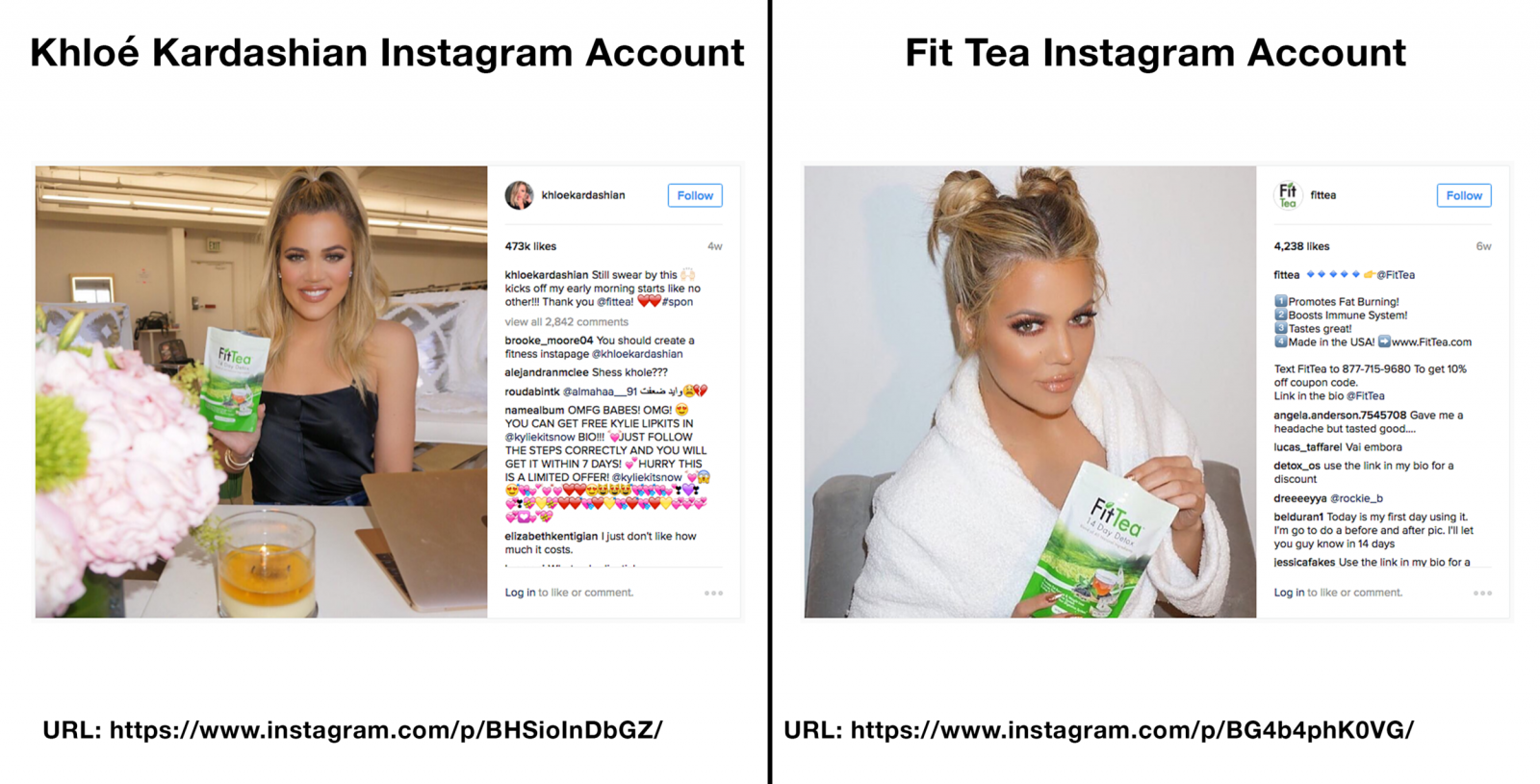
image: @KourtneyKardash instagram
FitTea is coming under fire with the National Advertising Division (“NAD”) for consistently enlisting influencers to promote its weight loss tea products and failing to ensure that such individuals disclose that they were paid to do so.
According to the NAD, a division of the Better Business Bureau (“BBB”), tasked with “reviewing national advertising for truthfulness and accuracy, and fostering public confidence in the credibility of advertising,” Arizona-based FitTea reposted numerous Instagram endorsements on its own site, under the heading “Results and Reviews,” in violation with the BBB’s advertising regulations.
The Role of the NAD
The BBB’s Code of Advertising – which was initially developed in the 1970s to provide guidance to BBB chapters across the U.S. and Canada for reviewing advertising claims made by businesses across North America – prohibits the use of advertisements that are “likely to mislead or confuse” consumers.
The Code states that “advertising which uses testimonials or endorsements is likely to mislead or confuse if … Endorsements placed by advertisers in online blogs or on other third-party websites do not clearly and conspicuously disclose the connection to the advertiser.” In short: If an influencer was paid to promote a product online and fails to disclose that, such an endorsement represents a violation of the BBB Code of Advertising.
Though most cases are brought by competitors, consumers may also submit complaints about national advertising campaigns to the NAD, and the NAD may then initiate an investigation of the advertising at issue. Following the NAD’s standard procedures, the challenger and advertiser in a proceeding may then submit arguments and evidence supporting their respective positions and, within about 60 days, the NAD renders a decision as to whether the challenged claims are substantiated and whether they should be modified or discontinued.

image: truthinadvertising.org
While the decisions of the NAD are not legally binding on the parties, if the NAD recommends that advertising be modified or discontinued and the advertiser does not comply with its recommendation, the NAD can refer the matter to an appropriate governmental body for further action.
The NAD vs. FitTea
Enter: FitTea, which the NAD began investigating last year after receiving complaints from consumers regarding its posting of disclosure-less endorsements and unsubstantiated health claims. Upon initiating an investigation of FitTea, NAD claims that the company modified its website to include the “#ad” disclosure on the paid-for Instagram endorsements, and vowed to require paid endorsers to disclose their connection to the company and to monitor posts to ensure compliance.
According to the NAD’s decision (#6042), which was released earlier this year, the organization “appreciates the advertiser’s changes to the endorsements and testimonials on its website” but criticized its ongoing practice of failing to disclose paid-for posts in connection with its products. Additionally, the NAD criticized the content of some FitTea’s paid for endorsements, namely ones that assert that consuming FitTea helps to promote with weight loss.
The NAD decision states, “While the diet and exercise program that FitTea promotes to customers who purchase FitTea might result in weight loss or other weight-related health improvements, there was no evidence in the record that drinking FitTea by itself will boost metabolism, boost immunity, burn fat or otherwise result in weight loss.”
Finally, the NAD took issue with FitTea’s practice of posting authentic consumer in conjunction with paid-for endorsements, thereby making it difficult – if not impossible – for consumers to distinguish between the two types of postings. According to the NAD’s decision: “It is important for consumers to be able to distinguish between independent reviews and testimonials or endorsements used as advertising for a product.”
With the aforegoing in mind, the NAD held that FitTea should not only require that influencers must properly disclose their connection to the company (namely, by way of “#ad” or “#sponsored” language), but FitTea should carefully monitor that such disclosures are, in fact, utilized. Moreover, the NAD held that FitTea should “separate its endorsements and testimonials from its authentic product reviews on its website, as well as to prominently distinguish which reviews on its website are authentic user reviews and which are not.”

image: truthinadvertising.org
In connection with the testimonials – either authentic or paid-for – that assert that FitTea’s products facilitate weight loss, the NAD held that FitTea should refrain from posting or re-posting those claims on its website.
Interestingly, none of the influencers at issue, such as the Kardashian/Jenners; actresses Ashley Benson, Vanessa Hudgens, Bella Thorne, Lindsay Lohan, and Sarah Hyland, among others; and the huge array of Instagram famous models, were named in the action. As such, the burden falls exclusively on the advertising company (FitTea in the case at hand) to ensure that the individuals it is paying disclose properly.







